17:55
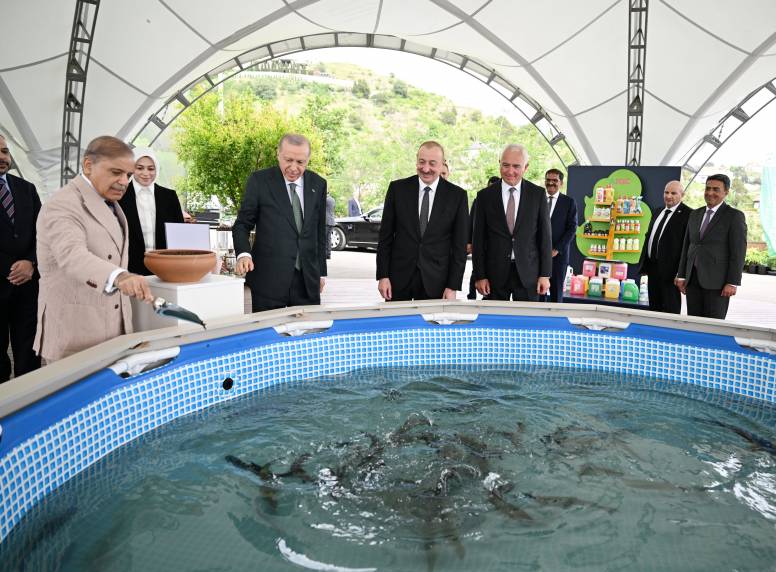
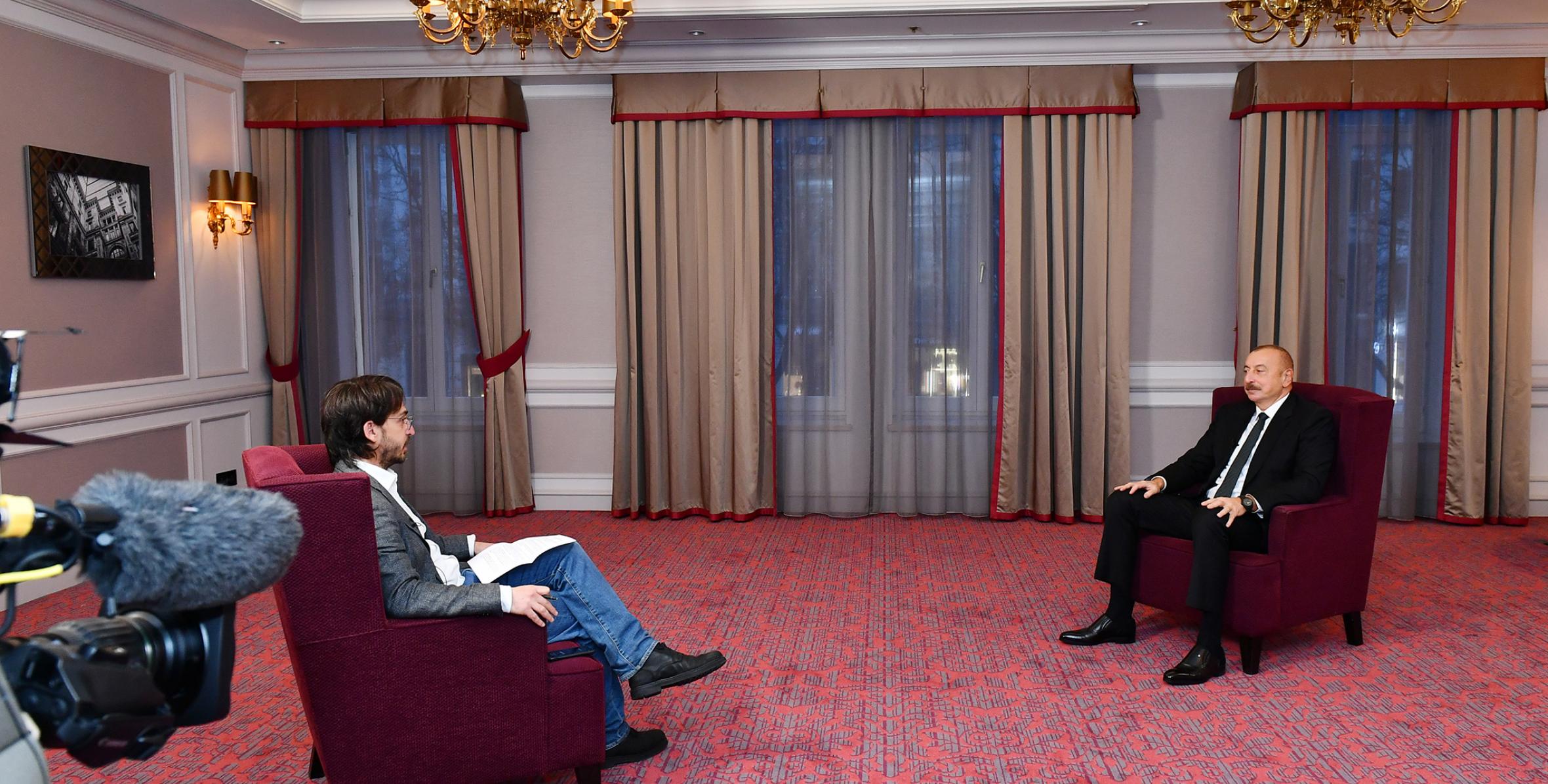
On December 14, President of the Republic of Azerbaijan Ilham Aliyev was interviewed by the Spanish El Pais newspaper in Brussels.
Correspondent: First of all, thank you for receiving us and visiting Brussels. Thank you also for receiving us at such a special moment and for allowing us the opportunity to conduct this interview. This is a very interesting junction from the point of view of the geopolitical situation on a larger scale and the point of view of the European Union and its neighbors on a small scale. Thank you for that.
First of all, I want to ask you about the current situation with Armenia. What is the current situation? We know that there were deadly clashes on the border less than a month ago. Of course, both sides put the responsibility on each other, and I want to know what happened in those recent events and what the current situation is?
President Ilham Aliyev: More than one year has passed since the war ended, and the general situation is relatively stable. If we talk about the area of responsibility of the Russian peacekeeping forces in the area of Karabakh, the situation is more stable than on the border between Armenia and Azerbaijan. And the reason is that Armenia, unfortunately, did not put down the attempts to take revenge. Their loss in the second Karabakh war was very painful for them. It was absolutely demolishing their ideological grounds, their propaganda for almost 30 years about the unbeatable army, about their strength, about the bravery of their soldiers and commanders. During the 44 days of the war, the Armenian army was totally destroyed. They had to sign the capitulation act on November 10 last year, agreeing to give back the territories that we did not manage to recapture during the 44-day war. Therefore, the signs of revanchism are visible in Armenian society, in their political spectrum. Therefore, understanding that it is impossible in the area where the Russian peacekeepers are serving, they try to make military provocations on the state border. Another issue is that the state border between Azerbaijan and Armenia was not identified. The occupation of that part of Azerbaijan was taking place at the beginning of the 1990s, right after the restoration of the independence of both countries.
Therefore, it was impossible to demarcate and delimitate the border physically and politically. Therefore, when the second Karabakh war ended last November, the climatic situation in that area was different from other parts. It was highly mountainous, and it was full of snow. So the snow started to melt in May this year. As soon as it happened, Azerbaijani forces were moving towards the state border and took the positions on the state border based on our understanding of where this border was going. So, that was the story, and unfortunately, Armenia started to claim that Azerbaijan was interfering in Armenia's territory without any grounds. So we are standing now where we think it's our territory. From the very first days of the end of the Karabakh war, we proposed that Armenia start working on delimitation, establish a joint working group on delimitation, and clarify all the disputes on the table. During this more than one year after the war ended, Armenia has made several attempts to make military provocations on the state border. All of them failed. As a result of all these attempts, they lost their military positions, and Azerbaijan strengthened this position on the state border. The same happened last month when they deliberately provoked Azerbaijani forces. It lasted several days, and during the first days, there was no shooting, just Azerbaijani soldiers explained to them that it was not their territory, that they had to leave, and they left. But they started to launch artillery attacks on us, and we had several victims and several wounded. Now the situation is stable. We did not plan anything ourselves. Otherwise, we would not stop. The clash on November 16 lasted less than one day. It started in the morning and ended at around 6-7 pm. So, if we had planned it, we wouldn't have stopped because Armenia doesn't have a military capability to stop us at any destination. We don't have this plan; therefore, we stopped. We want peace, and it's enough of war. We want stability, predictability, and zero risk for any attempt from Armenia to take revanchist actions. Therefore, we will be very closely watching all their maneuvers, regroupings, and attempts to create once again the military potential that can be a danger for us. If we see it happen, we will destroy it immediately, and they know it. And international players know it. If we see positive dynamics, we will definitely take advantage of that and strengthen peace.
-Mr. President, when do you think we will talk about the real peace treaty with Armenia, not just a ceasefire?
-That's a question that probably should be addressed to Armenia. I, on several occasions, publicly made statements that Azerbaijan is ready to start peace negotiations with Armenia and start working on a peace agreement. There has been no answer from Armenian leadership so far because I made such a statement for more than six months, several times. So, this shows that they don't want it. Because peace agreement, if signed, one of the main provisions of this peace agreement will be mutual recognition of territorial integrity of both countries. Armenia doesn't want to recognize the territorial integrity of Azerbaijan. The world recognizes Azerbaijan's territorial integrity and Karabakh as an integral part of Azerbaijan. Armenia doesn't say they do not recognize, doesn't say they recognize. Before the second Karabakh war, they said, and their Prime Minister publicly said that Karabakh is Armenia-period. That statement has ruined the negotiation process and was one of the elements of their bitter defeat last year. But now, it is as if Armenia has no position on that. We say that openly, we want to start immediate negotiations on a peace agreement with Armenia. As you said, this comprehensive agreement will be not a ceasefire but a complete peace agreement. But I hope that probably European partners will persuade Armenia that this position has no future. If they don't have a peace agreement with Azerbaijan, I think they may suffer again in the future.
-Are you going to reopen borders? Of course, this question is related to the previous one. Are you ready to open the borders to normalize relations with Armenia, and what are the conditions for this to happen?
-Yes, we are willing to open the borders. So far, there have been several rounds of negotiations in the framework of a trilateral working group headed by the deputy prime ministers of Azerbaijan, Armenia and the Russian Federation. The primary purpose and the task of this working group is to open communications. Several rounds of talks have been relatively successful. So, now the complete agreement about opening the railroad connection between Azerbaijan and Armenia is on the agenda. We started building the demolished railroad on the liberated territories towards the Armenian border. At the same time, Armenia was objecting to the highway's opening in previous months. But now we managed to persuade them that it's inevitable and they also agreed on that. So, there is understanding. Now we discussed the legal regime of these corridors. Zangazur Corridor will go through Azerbaijan to Armenia and further down to the Nakhchivan Autonomous Republic of Azerbaijan. The legal regime - here, we have specific issues that are still open. But I think both countries recognize that this must happen. During the trilateral meeting in Sochi last month held by President Putin, we adopted a Declaration that really talks about the opening of communications. So, it will happen. By the way, the airspace is already in operation. Azerbaijan Airlines flying from Baku to Nakhchivan started to cross Armenian air space.
-When the meeting with the Prime Minister of Armenia was announced in Brussels, the statement of the European Union said that the intention was to find ways to resolve tensions for the sake of a prosperous and stable South Caucasus. Of course, I thought about this railway and highway passing through the territory of Armenia. But what can we expect from the meeting in Brussels?
-Well, it's difficult to say, because we have to see what will be the result of the meeting which will take place later today. But we in Azerbaijan highly appreciate the activity of the European Commission and personally President of the European Council, Mr. Charles Michel, who is contributing a lot to the creation of ground for normalization of relations between Azerbaijan and Armenia. President Michel's visit this summer to the region was very productive. By the way, his initiative to establish a direct link between defense ministers of both countries is also working. So, this channel of communication is already efficient. So, this clearly demonstrates the willingness and readiness of the European Commission to facilitate the creation of a stable environment in the Southern Caucasus, and in the future, to facilitate the establishment of the trilateral format of interaction among the three Southern Caucasus countries. Azerbaijan's position is absolutely open and transparent. We want peace; we don't want war. We won the war, and we are the winner, and this reality should be taken into account. The Nagorno-Karabakh conflict has been resolved. There is no return to any discussions about the so-called status of Nagorno-Karabakh or something of that sort. We resolved it ourselves by force and by political means. We implemented the UN Security Council resolutions unilaterally after 27 years of being adopted. It is a new reality, which Armenia must take into account in the first place. It is a development of the post-war situation, and the leading international actors have already accepted the new reality. They are trying to build the future based on this new reality. Armenia should refrain from any hostile actions against Azerbaijan and refrain from territorial claims to Azerbaijan. I said a couple of times that we have much more historical grounds to have territorial claims to Armenia. They have to work on a peace agreement and comply with the expected behavior in the 21st century. We are neighbors. None of us is going to fly away to another planet. Therefore, we must learn to live side by side and slowly, step by step, preparing grounds for normalization of relations, including people-to-people contact. We openly said that we were ready for that. But so far, we don't receive any positive signs from Armenia. It seems that in Armenia's internal situation and, as I said before, the frustration and, mildly speaking, disappointment after the loss in the war created a kind of psychological trauma in their society due to exaggerated expectations and unrealistic assessment of the military and political potential. Therefore, for the government of Armenia, it's crucial to lead the process of normalization. Not to be behind the public opinion, which was based on the cultivation of hatred against Azerbaijanis. To lead the public opinion, to make critical steps to persuade the people that the only way for Armenia to develop is to normalize relations with Azerbaijan, to normalize the relations with Turkey, to become a neighbor, a normal neighbor, not a hostile neighbor, and to refrain from territorial claims. So, I think that if the Armenian government and political elite accept this formula, we have a chance for progress. As far as we are concerned, our position is straightforward. I several times articulated that publicly. And once again, I am saying that we want peace; we want stability, security and a prosperous future for the Caucasus.
-What would you say this EU trilateral contact in Brussels differs from the last meeting in Sochi? And it looks like much work has been done under the leadership of Mr. Putin. What would you say about the difference in contacts in Brussels?
Practically speaking, I don't see any differences because I see Russia and the European Union's genuine desire to help normalize relations between the two countries. Otherwise, they wouldn't spend time with us and spend hours in these negotiations. Russia and the EU are among the leading international actors. There are many things for them to do, an extensive agenda. If they spent time and effort and not once but regularly to convene with leaders of Azerbaijan and Armenia to discuss these issues, that means that their genuine desire is to help. And we appreciate that. We don't see any kind of rivalry here though some may think that a kind of competition. Not at all. We see that these efforts are complementary as far as we are concerned. These efforts can support the peace process. I also know that there have been interactions between President Putin and President Michel discussing many issues, including the relations between Azerbaijan and Armenia. So, I think that these efforts of an international community of institutions and countries interested in long-lasting peace may result in something very positive.
Because after so many years of occupation and hostility, international players definitely should support the process. Also, if Armenia agrees to engage with us in elaborating the peace treaty, of course, we will need international expertise. We will need international partners to help us formulate the chapters, formulate the basic principles, and find a solution. So, my expectations are related to this. Of course, everything will depend on how today's trilateral meeting will go. But our position is clear. We came here to strengthen the positive dynamic.
-Recent declaration of the International Court of Justice asks your government – I will read it out the way it is – to prevent the incitement and promotion of racial hatred and discrimination against the Armenian national or ethnic origin, to take necessary measures to prevent violence against all prisoners and detainees in connection with the 2020 conflict, to protect them from bodily injuries and ensure their safety and equality before the law. I would like to ask you what steps have been taken in this direction in connection with the situation?
-First of all, I would like to say that the International Court also issued a preliminary assessment based on our case against Armenia, and I would say that the decision so far made by this institution is balanced.
So if you read what is recommended to Armenia, you will probably see much more accurate and insisting. As far as we are concerned, in Azerbaijan, our state policy is aimed at the normalization of relations. Therefore, that's our position, and I openly announce it. With respect to public opinion, one should understand that for almost 30 years, Armenia, on the occupied territories, committed genocide against Azerbaijan's cultural heritage. Our cities and villages are leveled to the ground. There have been thousands of international visitors, including journalists from Europe and other parts of the world, who saw with their own eyes what they have done to our historical monuments, to our cities and villages.
Aghdam does not exist. Fuzuli does not exist; they are leveled to the ground. And that was done not during the first Karabakh war but the years of occupation. Deliberate demolishing of all the buildings and destruction of our religious monuments. 65 out of 67 mosques have been totally destroyed. In two remaining, they kept pigs and cows to insult the feelings of Azerbaijanis. Therefore, it is natural that many people in Azerbaijan, especially those who lost their beloved ones, who lost their territories have hostile feelings against Armenia. It is natural. It would be wrong to say now, the war ended and now let's become friends. It will take time. But what matters is the state policy. Several times already, I said that despite all these tragic events in our history, devastation and genocide in Khojaly, we need to turn the page. We want to build a stable situation if we look to the future. We want to minimize the risk of a new war. Ultimately, we need to turn the page. So, this is our policy.
Concerning detained persons, Azerbaijan, after the Second Karabakh War ended, released all the prisoners of war before Armenia. International observers can attest to it. Those now in detention cannot be considered prisoners of war because most of them have been sent to the liberated territories at the end of November, almost twenty days after the war ended, to commit acts of terror. And they committed these acts of terror as a result of which several servicemen and civilians were killed, and they have been detained and brought to justice. Some of them were released on humanitarian grounds. We released so far more than one hundred detainees. But those who committed crimes have been sentenced. So by no international convention, these people can be considered prisoners of war. Another thing, that some of the detainees after we returned, and we returned ten of them, just ten days ago, some of them have been arrested in Armenia. This is a very serious signal to us, these people, and their relatives. We returned them to Armenia, and they put them into prison. Probably, they will torture them, and they have very tough practice. Because what our hostages tell about the terrible time they spent in the Armenian prison shows that these people will be suffering very hard tortures. Therefore, if we return more, they will put us into prison.
So, this is a real fact, and it can be verified.
Let me ask again about the prisoners of war because there are direct claims from Armenia and international organizations that there are dozens of detainees, and no one knows the exact number. Prisoners of war have recently been exchanged for mine maps of your territories. I would like to know if there is a list of these people and whether you are ready to share the list of those detained. You claim that they are terrorists, while the other side claims that they are prisoners of war. Can we have access to the list of names and their number?
-Yes, it's not a secret at all. And the list is known, international institutions know, and Armenians know. For instance, due to their military provocation in the middle of November, more than 30 Armenian military servicemen have been detained. One of them was wounded, and our doctors took care of him. They conducted a medical surgery, and he recovered, and as soon as he recovered, we sent him back. It is a true story that can be verified. Ten people from that group have also been returned, and many are now in Armenian prison. So, more than 30 detained Armenian military servicemen resulted from Armenian provocation in November and 40, maybe 41-42, resulting from the military provocation last November. So, we do not hide the number. The Armenian side was provided the list of their names and surnames, and dates of birth. So, they know it, the international institutions know it. We do not hide it, it is not a secret, and the decision of our court is also open to the public. So, everybody knows how many of them there are. But again, it's a matter of justice. Those who did not commit any crime, who did not kill Azerbaijanis have been released, as I said, more than one hundred. As far as I know, those who committed minor crimes received minimal sentences. Those who participated in the killing of Azerbaijanis must be brought to justice as any other country. But again, these people were detained at least twenty days after the Second Karabakh War ended. On November 26, they were sent to liberated territories, and they were detained at the beginning of December last year and the next group, as I said, this November. So, this is absolutely a transparent picture.
-Is it possible that these people will be returned to the Armenian side under the agreement on the assessment of prisoners of war and the cessation of hostilities?
As I said already, ten of them were returned just ten days ago, and the process continues based on the humanitarian ground. We never said no, but it must be based on the legal framework in Azerbaijan, justice and humanism. So, the combination of these factors is here. And the process is ongoing. Therefore, we cannot exclude that this process will continue. I cannot tell you now when and how, in what stages, but it will continue.
-Let me turn to reserves. As you know, the EU's gas reserves have been declining recently, while gas prices are rising. There are tensions in relations with Russia, our main gas supplier accounting for 40 percent of our imports. The relationship is going through its worst period. Azerbaijan's economy is based on oil and gas exports, and its export markets are the EU and the West. How would you analyze the current situation? How can the EU and the region cope with the current crisis?
-First of all, I would like to say that we are working actively on diversification of our economy and to reduce dependence on oil and gas. If you look at the structure of our GDP, the oil and gas factor is less than 50 percent. But in our export, of course, these are the main products of our export and the export is growing with respect to natural gas. There is a current gas price crisis, if I may call it, so I don't know. Frankly, I'm not interested in what is a reason. What were we doing? We were doing our homework. We were attracting multi-billion investments to the oil and gas sector and working on one of the significant infrastructure projects of the 21st century, the Southern Gas Corridor, completed on the last day of the last year. The fourth segment of that project, the Trans-Adriatic Pipeline, was commissioned on December 31, 2020. Since that time, our exports to Europe started. Before that, our exports were going primarily to Turkey and Georgia. So, now among recipients of our gas, the biggest is Italy among EU countries, followed by Greece and Bulgaria. And there is a potential to expand the geography. This year we already exported to the EU more than 7 billion cubic meters of gas. Next year we plan to export 9, and in 2023 the plan is 11 billion cubic meters, and it can grow. But of course, you know that the gas market is different from the oil market. You need to have contracts. All the gas we extract for export has been contracted before we inaugurated the pipeline. So, that is how the gas business works. Therefore, to plan an increase in production or to plan cooperation with new members of the EU, we need to engage in negotiations on a practical level and evaluate the potential of that party, evaluate the connectivity of gas infrastructure systems in Europe. I know that the work is underway to make more connections and plans. Our gas is sold on long-term contracts, and we obey the contracts hundred percent. So, Azerbaijan is a reliable partner for the EU and this issue, of course, is permanently on our agenda. So, my assessment is that we have huge deposits of natural gas, we have a shorter transportation route than the traditional suppliers of natural gas to Europe. Our gas is new, for the European market, because as you said production in EU and some European countries not members of EU is going down. We all know that demand for natural gas in Europe will grow because of some decisions made by some countries concerning their energy strategy, and Azerbaijan here as a reliable partner, as a friend to Europe, as a county which already completed all the infrastructure works. Imagine, 3,500 kilometers of pipeline from Baku to Italy, a part of which goes under the sea, was done. Everything is ready, and gas is coming. So, we only need to engage closely with the European Commission and with member states, those who want to get more gas from us or those who want to get new gas from us and start negotiations.
-Was the new gas corridor, the TAP project you implemented last year, mentioned in your talks with Mr. Putin? Is this a concern for Mr. Putin because it is an alternative to Russian gas?
No, frankly, I can tell you that never with President Putin had we discussed this issue. Though we meet regularly several times a year, we are permanent on the telephone conversation. However, he never raised this issue because I think this subject of the competition is vastly exaggerated. Our gas supply can by no way compete with the Russian gas supply. Russian export to Europe is hundreds of billions of cubic meters and is growing. As I said already, our export to Europe is not a competition, and we never looked at it as a competition. For us, this project was commercial, a project of commerciality. Because now when all the infrastructure pipeline works have conditions. The internal rate of return of Shah Deniz Gas deposit which is the primary source of our gas supply to Europe and other countries. The internal rate of return increases. So it became very attractive from a commercial point of view. So, we had huge gas deposits, and we needed to have a market.
What could be a market for us? It cannot be Russia because Russia itself is exporting. It cannot be a big market in Georgia because Georgia's demand is relatively small. It can be Turkey, further down, Europe. That's what we have done. Supplies to Turkey started in 2006 and grew steadily, and supplies to Europe started. For us, it's commercial. It was politicized, unfortunately to a large degree, without any grounds. The Russian Federation's leadership clearly understands the real substance of the story. Our gas is nowhere an alternative; it's just additional supply demanded, which is needed for consumers. For instance, now our gas makes about 20 percent of Turkish demand, close to 90 percent of Georgia's demand. By the time we increase the supply to EU will also make substantial part if in EU some member states demand.
-My last question is about drones. In the war with Armenia, the presence of drones proved very important. I would like to know your thoughts about this. You have drones based on Israeli and Turkish technology, if I am not mistaken. I want to know if these drones will be sold in the world now. You have the opportunity to produce them independently and sell them to the world. Is the world interested in this? In general, it reflects modern war and how drones have become a necessary element of modern wars.
-Yes, it's a general assessment by international military specialists that Azerbaijan conducted the war of the 21st century. No one before us conducted the war in such away. It was not only drones. It was a very accurate reconnaissance. It was the integration of, as you said, drones from both countries-Turkey and Israel. The Israeli drones we have are surveillance drones, and the Kamikaze drones and Turkish drones are surveillance and fighter drones. And to integrate this into a single military operation was not easy. The same goes for our air defense system. We have an air defense system of Israel, air defense system of Russia S-300. We have an air defense system - BUK. So, integrating these air defense systems was also a challenge. We protected ourselves from an enormous tragedy by efficient use of air defenses because Armenia was launching ballistic missiles against us and destroying sleeping cities. The city of Ganja several times suffered the attack by Scud missiles, and they were targeted to destroy their living compounds. They used Iskender M ballistic missiles on the last day to destroy Shusha, and there was no one. Therefore, many of these missiles were intercepted by our air defense. So, air defense, drones, artillery, and the drones that were providing targets to artillery. It's not a secret any longer than in the first days of the war. We were using light airplanes to discover the Armenian air defense system. The pilot was jumping out, and the small plane for agriculture purposes was used. We were going to the positions, and the Armenian air defense was discovering itself by attacking this useless target, and then we were destroying the Armenian air defense. So, a combination of these factors plus first is the motivation and courage of our soldiers and officers who sacrificed their lives. Almost 3,000 Azerbaijanis died for their motherland. All these factors played a decisive role in the victory in a challenging geographical condition because we had to climb the mountains where Armenians for almost 30 years created six lines of fortifications and mines. We have almost 200 people killed or injured only after the war due to land mines. Of course, all that created the ground for our victory. With respect to the drones, we are continuing to purchase them. After the war ended, we signed new contracts to buy new modifications. At the same time, we are also, as you said, producing surveillance drones, not fighters and not Kamikaze. These drones are available for the market. Azerbaijan exports its military products to more than 30 countries, and we have already developed a military-industrial complex that produces our basic needs. We continue that because, as I said, there is still a threat of Armenian revanchism. There is still a threat of destabilization. So, we must always be ready to defend our border.
-Has the outcome of the war increased your interest in military products?
-Yes, of course. That and also interest in our experience. Because we have been approached already by several countries which want to learn our experience how we did it, but again, as a Commander-in-Chief who was from the first until the last day of the war in charge, I can tell you that it will be difficult to explain how we did it because you need to feel it. After all, we were suffering from Armenians' occupation, humiliation, and arrogance for almost 30 years. They were sitting on our lands, destroying our lands, claiming that these lands belonged to them, contradicting all the essential international organizations' documents. United Nations Security Council, OSCE, Council of Europe, and European Parliament adopted resolutions supporting us. But they were just sitting there and declaring that they would sit there forever. So, motivation and spirit were the main factors of our victory and courage. This was a matter of national dignity and national pride. So, though we are approached by many about how we did it, I think it will take many years to explain.
-Thank you so much for your time and the interview.
-Thank you.
-I wish you success in your meetings today and in the coming days.
ReplyForward
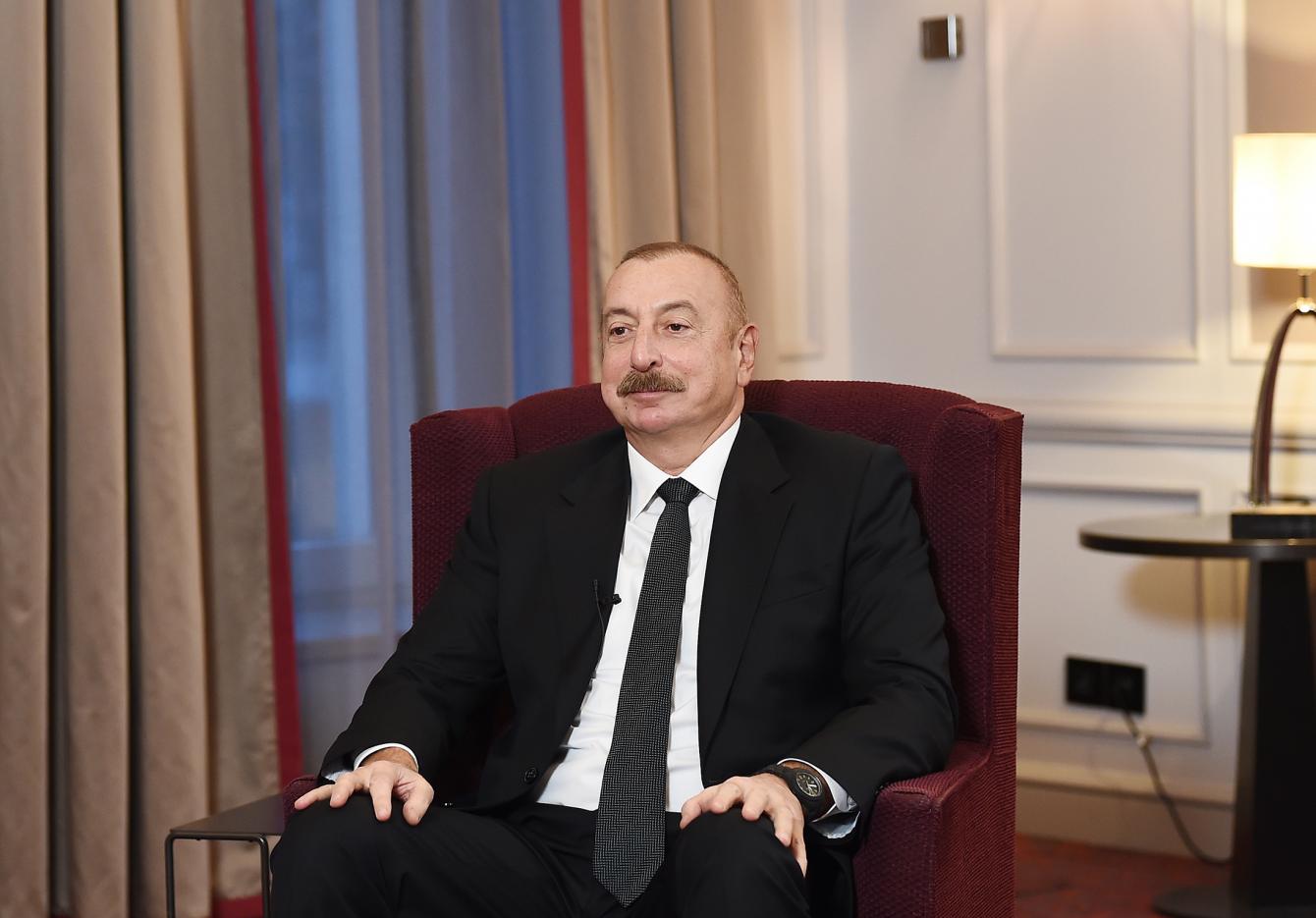
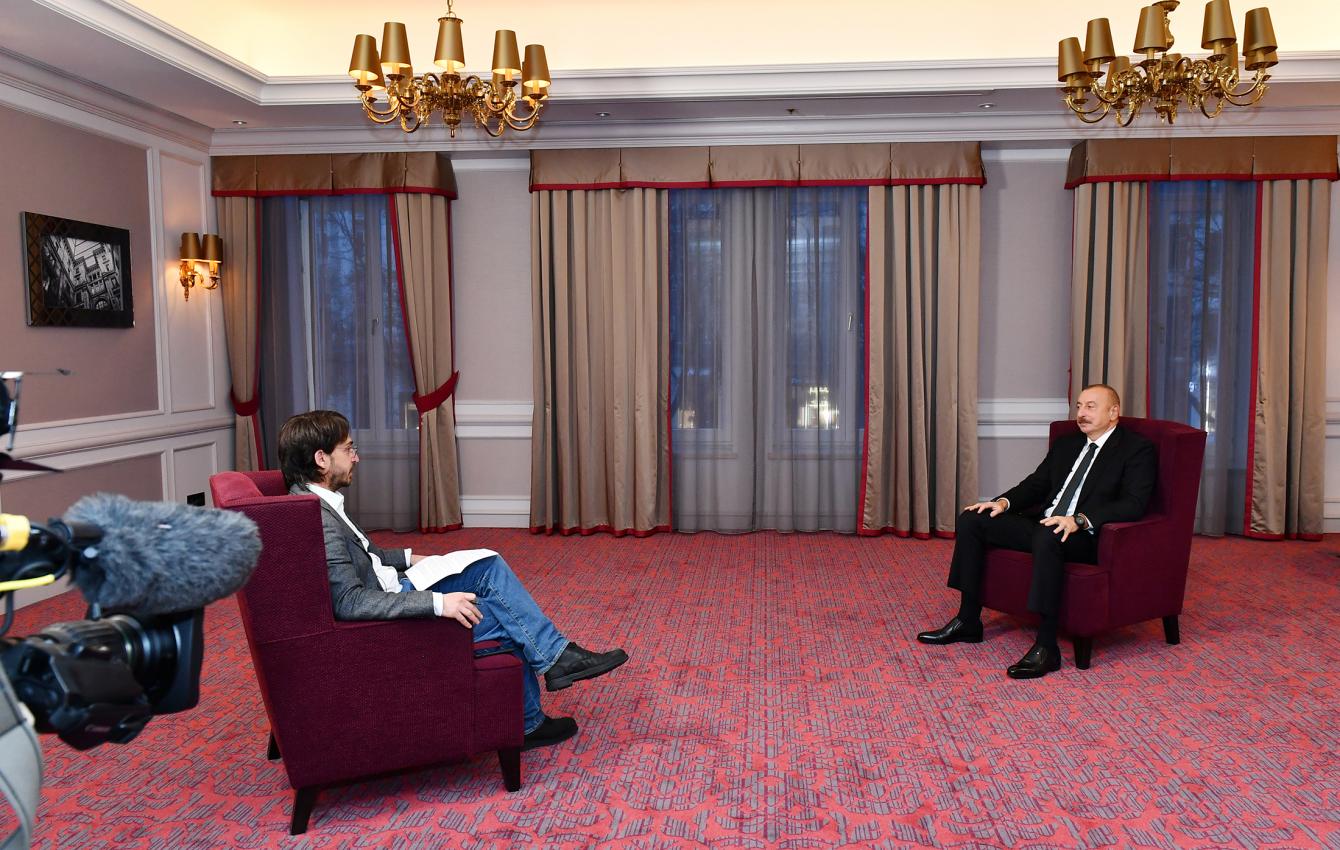

His Excellency Mr. Ilham Aliyev, President of the Republic of Azerbaijan
Dear President Aliyev,
On behalf of the American people, I want to congratulate you and the people of Azerbaijan on your Independence Day.
We value our relationship with the Republic of...
28 May 2025, 17:40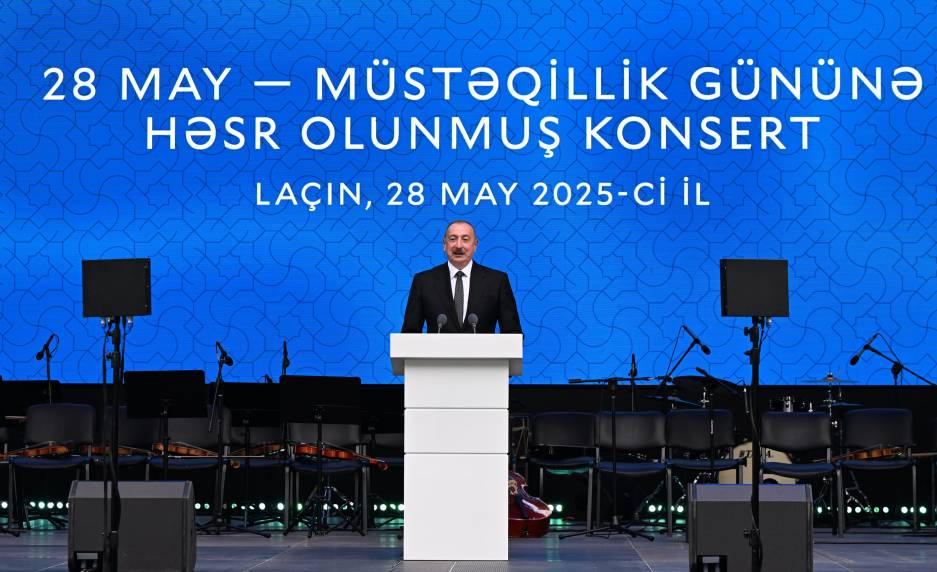
His Excellency Mr. Ilham Aliyev, President of the Republic of Azerbaijan
Dear Mr. President,
On the occasion of Azerbaijan's Independence Day, I extend my warmest congratulations to you and the people of Azerbaijan. I wish your country continued progress,...
28 May 2025, 15:25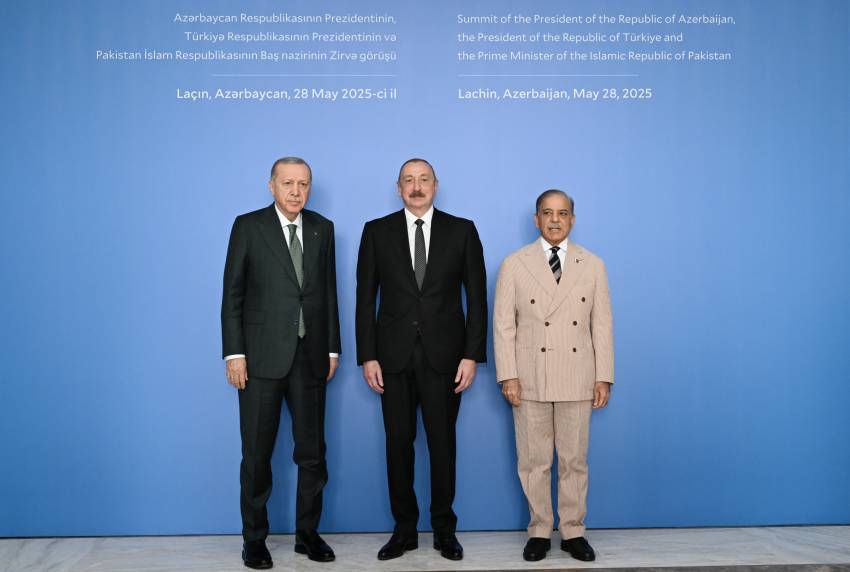
His Excellency Mr. Ilham Aliyev, President of the Republic of Azerbaijan
Your Excellency,
On behalf of the International Secretariat of the Organization for Democracy and Economic Development - GUAM and me personally, I would like to extend our most sincere...
28 May 2025, 13:58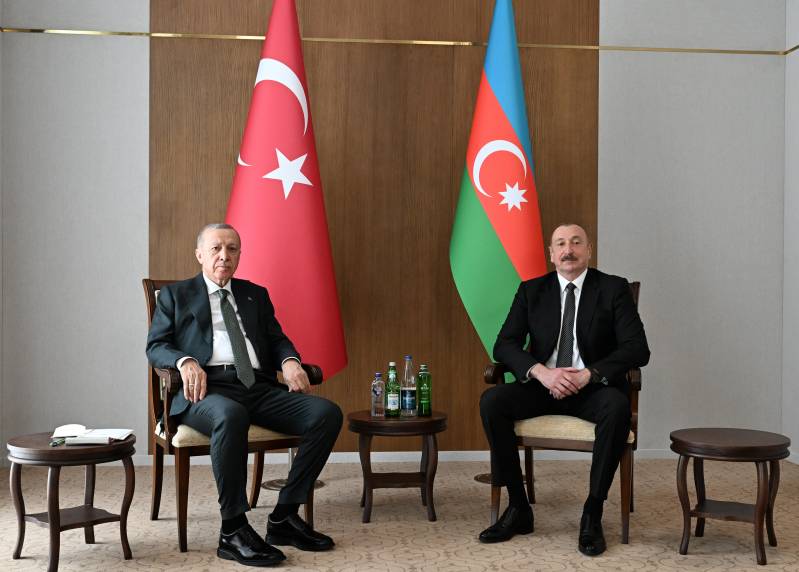
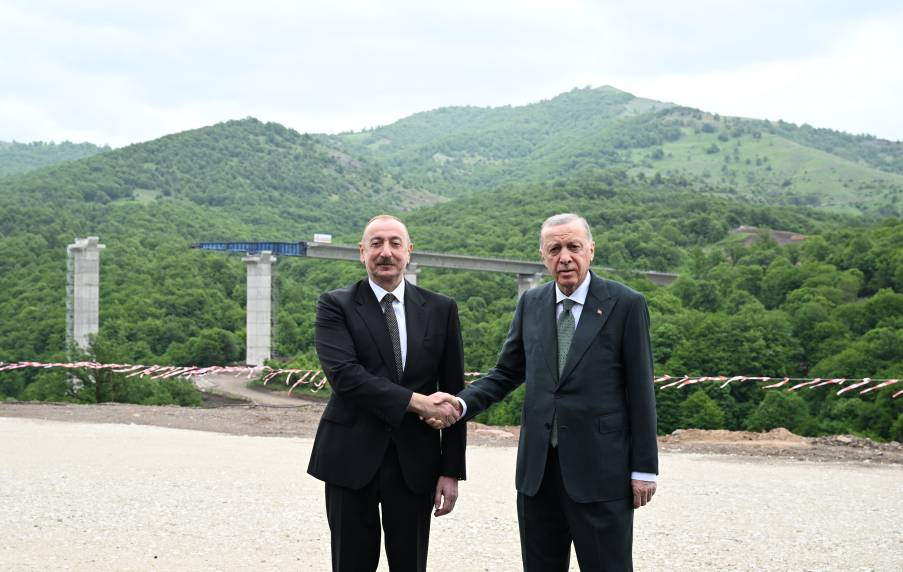
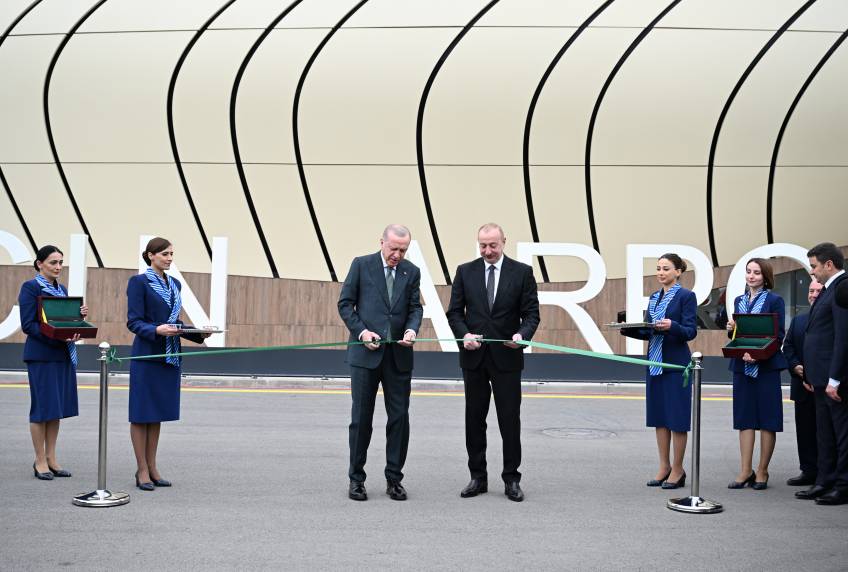
His Excellency Mr. Ilham Aliyev, President of the Republic of Azerbaijan
Dear Mr. President,
On the occasion of the National Day of Azerbaijan, it is with sincere joy that I send Your Excellency, on behalf of the Portuguese people and myself, greetings and wishes of...
27 May 2025, 19:55His Excellency Mr. Ilham Aliyev, President of the Republic of Azerbaijan
Your Excellency, dear friend,
On behalf of the Presidency of Bosnia and Herzegovina and in my personal capacity, I extend to you my heartfelt congratulations on the occasion of May 28 –...
27 May 2025, 19:53His Excellency Mr. Ilham Aliyev, President of the Republic of Azerbaijan
Excellency and dear brother,
As the Republic of Azerbaijan celebrates its National Day, I am pleased to convey to you my sincerest congratulations, wishing your esteemed person continued good...
27 May 2025, 19:51